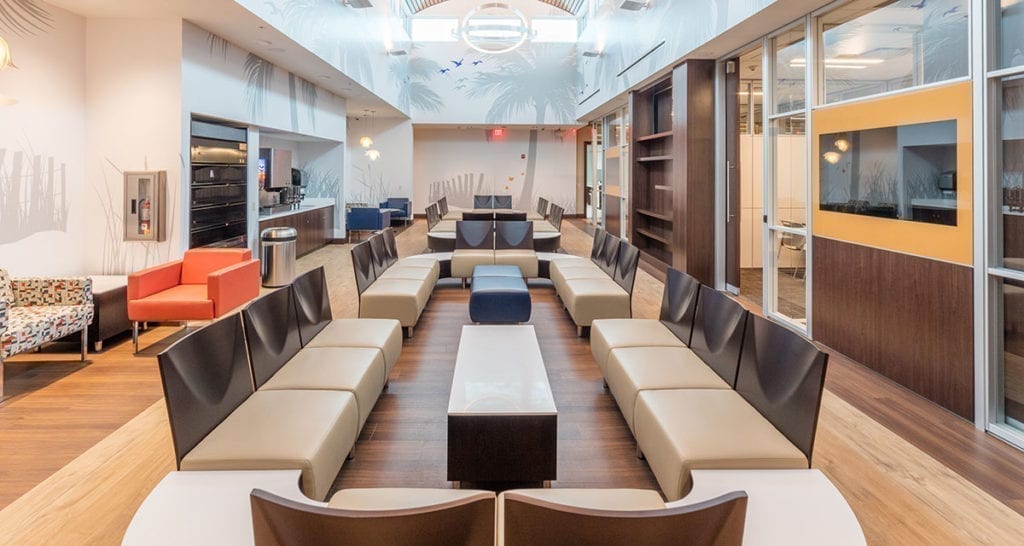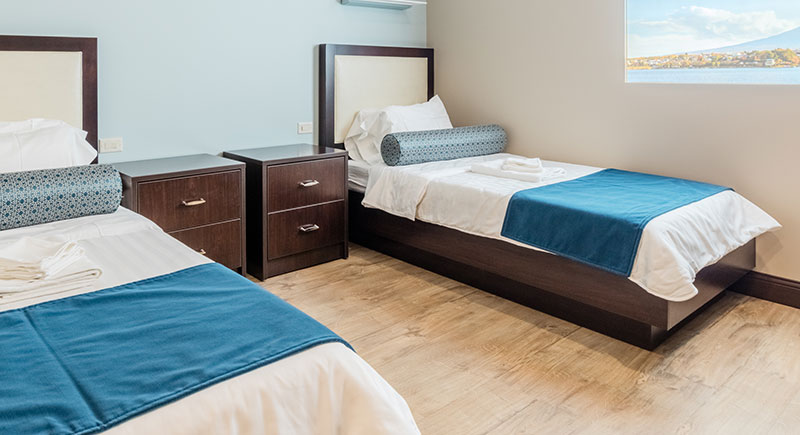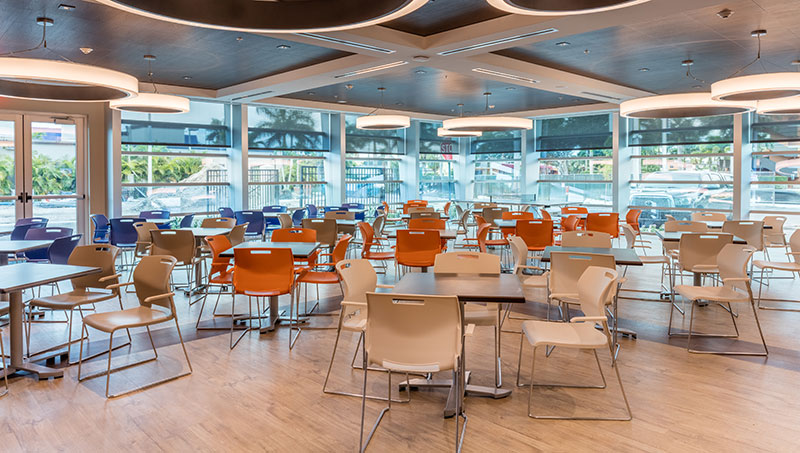
Today, more than 22 million people are living with a substance addiction, yet only a fraction of them will seek treatment. This makes it less likely that they’ll end their dependence on drugs or alcohol. Fortunately, though, people can get the help they need to manage their addiction successfully by enrolling in an inpatient addiction treatment program.
Many people begin the treatment process with inpatient rehab treatment, because they’re able to focus on their therapy without outside distractions and get the 24-hour medical support they need during this early phase of recovery. Plus, the longer a person spends in addiction treatment, the less likely they are to relapse. Residential treatment affords them this opportunity.
What Is Residential Treatment?
Residential treatment is one of the most important components of drug and alcohol rehabilitation. Generally the initial phase of an addiction treatment program, it often includes a medical detox protocol for drugs and/or alcohol. Attending a residential rehab allows those struggling with addiction, alcoholism, or mental health conditions to take a step back from the stresses and responsibilities of daily life to focus on personal recovery. Our state-of-the-art, campus-style facility is a comfortable and hospitable place to receive treatment in a safe, supportive and therapeutic environment.
The inpatient drug and alcohol recovery program at FHE Health can last anywhere from 21 days to 90 days (and in some cases, even longer). The actual length of stay is unique to each patient and is based on individual needs and preferences. We provide multiple levels of care, including outpatient services, and have a wide variety of programming with classes geared for specific needs.
Upon arrival to treatment, every patient must go through a thorough intake process which includes both a medical and psychological assessment. This allows us to create a baseline for their addiction or mental health concerns and provides us with the status of their overall health. Patients meet with doctors and therapists in order to determine the first steps that need to be taken toward a successful recovery.

Detox and Residential Treatment
Almost all of our patients begin their treatment by completing a detox protocol. This is the period of time in which the body is ridding itself of the substances it has become dependent on. In many cases, this process can cause unpleasant withdrawal symptoms. Fortunately, our medically advanced detox center treats all symptoms of withdrawal, ensuring that this process is as smooth, comfortable, and safe as possible.
Once detox is complete, patients enter the inpatient addiction program, where they are provided with access to continuous medical, clinical, and psychiatric care. We also provide an array of wellness features, including a full gym, massage room, and nutrition services. Patients typically meet with psychiatrists weekly, along with medical doctors, therapists, case managers, and the neuro-rehabilitative team.
The Benefits of Staying at an Inpatient Addiction Treatment Facility
Many people opt for inpatient rehab to begin their recovery journey. At this point, patients are often unstable and need help managing their cravings to use and their exposure to drug or alcohol triggers. At FHE Health, we’ve designed a comprehensive inpatient program that helps patients build a strong foundation for lasting recovery.
Our inpatient program features evidence-based therapies like cognitive behavioral therapy that are known to support recovery as well as alternative and holistic treatments that enhance the recovery process in some way. We’re able to target each aspect of the addiction in our facility, giving patients the strong start they need to transform their lives.
Enrolling in FHE Health’s residential treatment program allows patients to fully immerse themselves in their therapy without the distractions of home. Toxic relationships, drug dealers, work stress, other stressors—all of these factors can tempt an individual to use. Because they aren’t present during inpatient rehab, they can’t threaten to derail the individual’s early recovery, which is when you’re most vulnerable and just beginning to learn how to cope with these triggers. That’s important because relapse is a substantial threat for people with substance use disorders. Eliminating these triggers during the initial weeks of therapy gives patients a chance to grow in stability and coping ability so that they can avoid relapse once they transition back into their normal lives.
Another advantage of inpatient treatment at FHE Health is our comfortable and safe environment. Our facility features comfortable furnishings, semi-private rooms, and amenities that enhance the recovery process. For instance, we feature massage treatments and leisure activities that help patients de-stress between treatments.
Finally, patients who enroll in FHE Health’s residential treatment program can expect to meet with highly trained medical doctors, psychiatrists, and therapists who specialize in addiction medicine and treatment. Our care team stays up to date with the most innovative and best practices associated with substance abuse treatment. From evidence-based therapies to holistic treatments, our program options are always delivered by our caring clinicians.
FHE Health Treats Dual Diagnosis
As many as 45 percent of people who have a substance addiction also suffer from a mental health disorder. On their own, each condition can be challenging to manage; together, they can be debilitating. The best way to treat co-occurring disorders is simultaneously. FHE Health can provide the addiction and behavioral health treatments needed to effectively target both conditions.
FHE Can Provide Medical Care
Not all addiction treatment centers have the clinical teams and facilities needed to offer medical care for people. It’s not uncommon for people with substance addictions to also have other conditions that require medical treatment and monitoring. At FHE Health, our clinicians are able to provide the medical treatment that patients need. In fact, we are professionally staffed to support our patients 24/7, seeing to their well-being in every respect.
What Sets FHE Health’s Residential Treatment Apart?
There are numerous rehabs that treat people suffering from substance abuse disorders, but not all of them have the clinical staff, programs, and facilities needed to address medical care, behavioral health, dual diagnosis, and the different levels of care associated with comprehensive addiction therapy. FHE Health treats the whole person.
Our inpatient treatment programs target the physical, psychological, and behavioral aspects of addiction as well as any other mental or physical health conditions that may be present. The fact is, most rehabs in our region cannot offer the same level of comprehensive care that we can.
We complement our treatment expertise and experience with our empathetic care for our patients. Our clinicians have devoted their careers to helping people overcome their addiction and they are genuinely gratified to see patients hit recovery milestones, rebuild their lives and health, and escape from the clutches of drug and alcohol dependence. We care deeply for our patients and support their recovery in every way we can.
If you are suffering from an addiction to alcohol or drugs, inpatient addiction treatment can help you end your substance dependence. Contact FHE Health to discuss our inpatient enrollment process. We can begin your health evaluation right away and then discuss the best treatment options for your needs and preferences. We look forward to helping you transform your life for the better. Don’t put off treatment another day.









